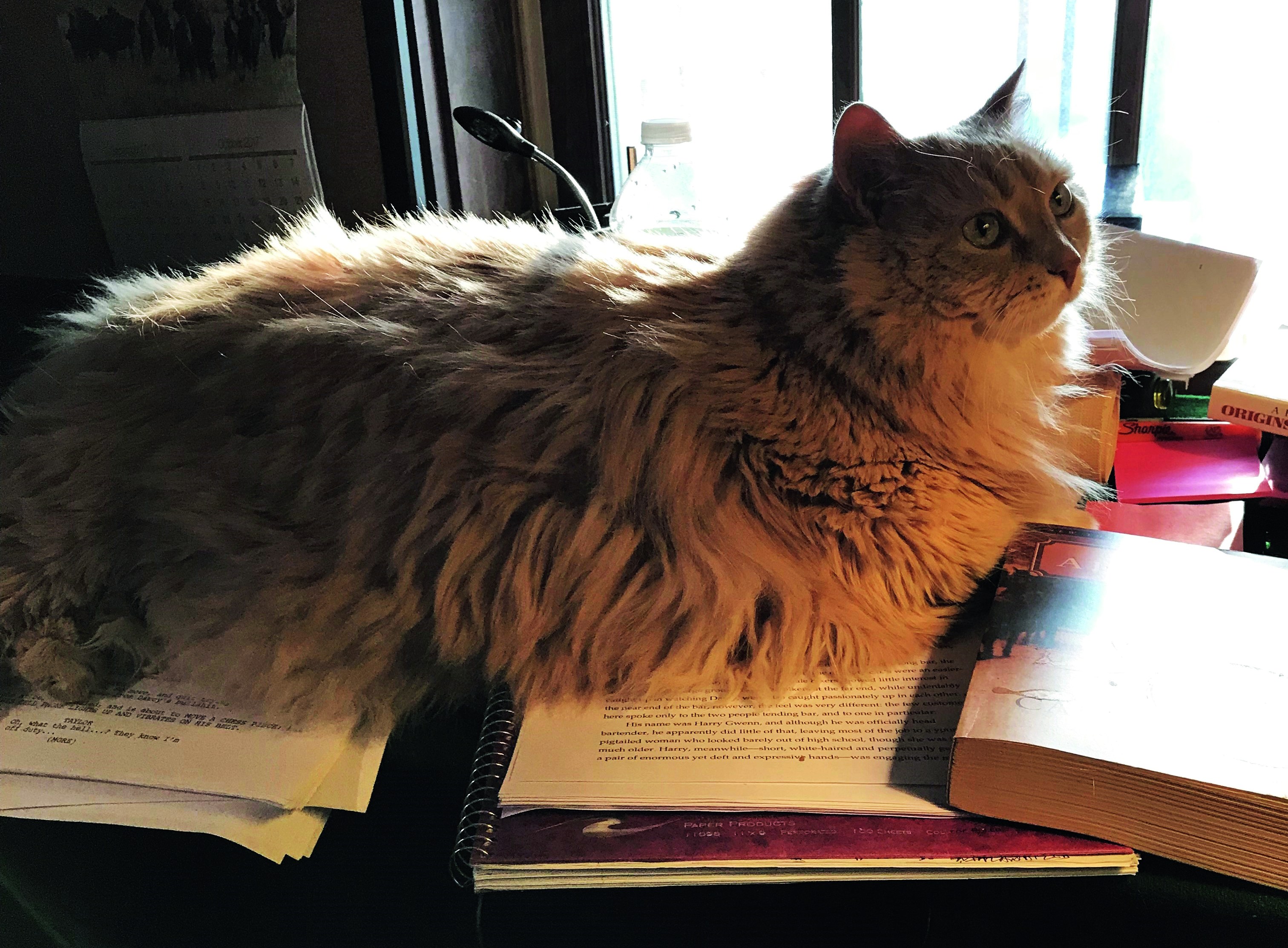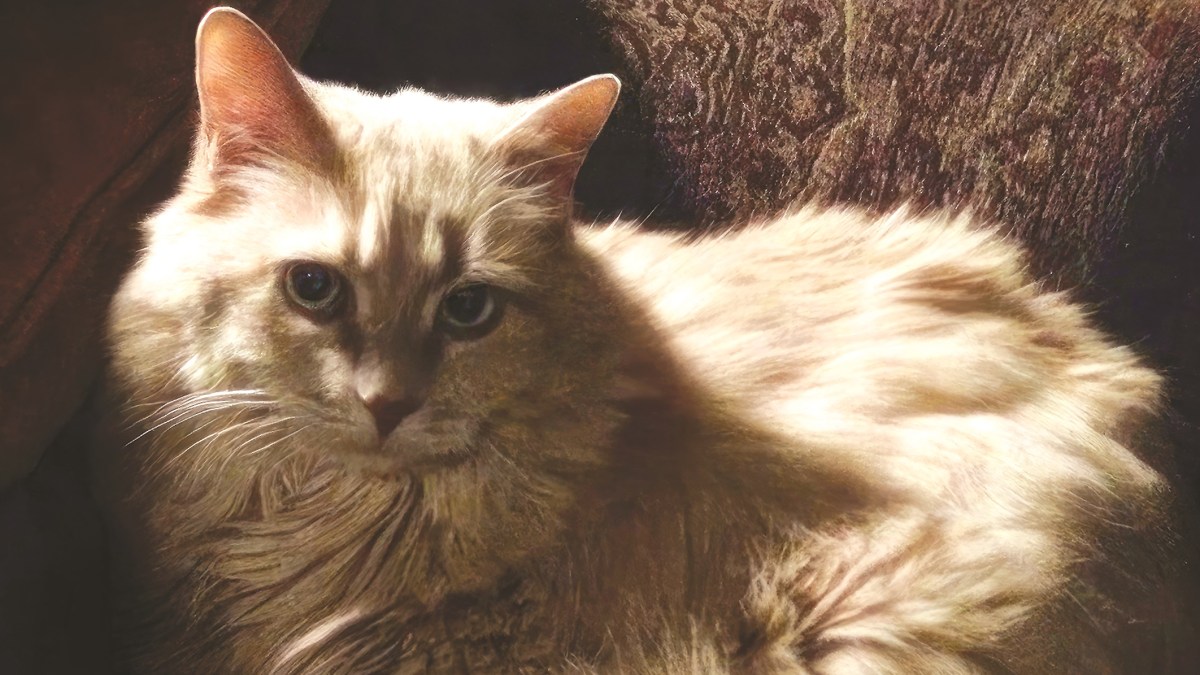Caleb Carr grew up knowing that he had once been a cat. He first expressed the concept at the age of five, when he presented his mother with a self-portrait. It showed the body of a boy, dressed in trainers, jeans and a shirt, and a huge cat head with bright green eyes on top of its neck. “This is me before I was born,” he told her. The conviction never left him. All his life, the American military historian and author was sure that he had become “imperfect or incompletely reincarnated” human. How else to explain his intense connection with cats?
And boy, is it intense. For the last two decades of his life, Carr lived in a large stone house on a 1,400-acre estate in the foothills of Misery Mountain in upstate New York. The winters were long and wild, while the rest of the year bears, giant weasels, coyotes, and men roamed to no avail outside. His only housemate was Masha, a semi-feral Siberian forest rescue cat. To anyone who dared ask the question, “How could you live so long alone on a mountain with just a cat?”, Carr had a succinct rebuke. Masha was very much not “just a cat”. This memoir, My beloved monster, is there to prove it.
Carr, who died in May aged 68, rose to fame with his bestselling 1994 novel The Alienista whydunnit about a serial killer set in 1890s Manhattan. He wrote additional murder mysteries as well as military history. My Beloved Monster: Masha, the half-feral rescue cat who saved mehis latest book, is a different beast. It’s a warm, heavy love letter to Masha and her feline predecessors. Between James Middleton and his spaniel, public servant Chloe Dalton and her poor hare, and Rory Cellan Jones and his rescued Romanian bastard, there’s no shortage of writers praising the life-changing bonds they formed with their animals. But Carr’s relationship feels more extreme. Like much of his earlier work, questions about the dark cycle of violence and its enduring aftermath are its backbone.
Carr was the middle son of Lucien Carr, a member of the Beat Generation who was convicted of manslaughter for killing his predatory former scoutmaster, who was obsessed with him, and rolling his body into the Hudson when he was a 19-year-old student at Columbia.
Until his parents’ divorce, Carr grew up in a rough neighborhood in downtown Manhattan. Jack Kerouac, Allen Ginsberg and William S Burroughs were regular visitors to the house. The parties were heated, the arguments passionate. If that sounds cool, it very much wasn’t for Carr and his brothers. “Unbearable,” is how Carr puts it. His childhood was defined by abuse and alcoholic parents. Lucien found his son in his bed and dished out blows, while his most damaging habit was pushing his son down stairs. “I began to understand that he was trying to kill me,” Carr writes.
• What is the number one rule of living with a cat?
Through it all, it is Carr’s cat Zorro, a superlative muse who once stole a whole roast chicken, who remains his only faithful companion, his “faithful model and heroine”. It is no exaggeration, Carr insists, to say that she saved his young life, as other cats would later do, by teaching him “not just a talent for survival, but compassion, affection, love and joy”. None of that got Carr from the people around him.
Later, he decides he wants to break the legacy of abuse and never have children. That explains why so few My beloved monster is handed over to humans. In fact, only his cats (Carr never stoops to calling his animals “pets”) are given names. And there are many of them, colorfully captured in all their idiosyncrasies. But it is Masha, with her long white whiskers, magnificent tail and hazel eyes, in whom Carr believes he has found his “alter ego”.

Masha was rescued from an abandoned locked apartment before being taken in by Carr
It is Masha who, at least in Carr’s telling, chooses him when he visits the animal rescue center in Vermont. She holds out one of her huge paws towards his hand and dispenses “loving” bites. The staff is shocked. Since Masha was rescued from an abandoned locked apartment, she had almost exclusively attacked handlers and potential adopters. “You’ve got to take the cat,” an employee pleads with Carr.
He takes her home to Misery Mountain. Unlike dogs, a cat’s trust is earned, Carr explains, and over the course of a lifetime, a cat will usually only form one special bond. Carr is well-versed in feline language (he has, remember, “all the qualities that I had taken from members of the species in the first place”) and soon wins Masha’s trust. They become a couple, in harmony with each other and their rhythms match. They share a love of the Romantics – “nothing soothed her like the deep strains of a Wagner orchestra” – and enjoy being alone in each other’s company. It all feels terribly human.
The problems come from the outside world, from the danger of the fierce predators that lurk in the surroundings to which Masha is drawn. Earning her mantle as “Warrior Queen”, she impresses even the hardened vet with her battles with weasels and bears. Unfortunately for the reader, her habits may mean that Carr seems to spend a lot of time looking for her outside.
• 12 exceptional memories from the last 30 years
Carr is a voracious researcher, and he tries to back up the more extreme of his cat statements with science. But there are points when it becomes a bit much. As unusual as Masha is, I just couldn’t swallow the idea that “she saw something in the sunset that transcended the vast, uninhabited landscape to the west: time itself, I came to believe, was a fascination of hers”.
He knows that he must not over-identify with her, but the parallels are there – and poignantly told. She develops neuropathy, which vets believe came from being kicked as a kitten. Carr is also plagued by chronic health problems stemming from his father’s addiction. Their health declines in tandem. And by the time Masha is dying and Carr whispers “be where I can find you,” the idea that she is his spirit animal and that he was once a cat makes remarkable sense.
My Beloved Monster: Masha, the half-feral rescue cat who saved me by Caleb Carr (Allen Lane £25 pp352). To order a copy go to timesbookshop.co.uk. Free UK standard P&P on orders over £25. Special discount available for Times+ members
